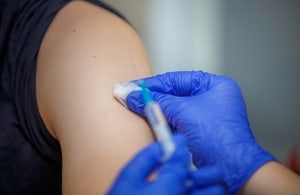CASES of COVID-19 in Dumfries and Galloway had almost doubled in number by the end of last week.
A total of 57 new cases were recorded in the week ending Sunday June 13, up from 29 in the week before.
Numbers of close contacts also increased markedly, rising from 191 to 410.
NHS Dumfries and Galloway Chief Executive Jeff Ace said: “The new Delta Variant is driving up the number of cases in the region, as we know it is much more easily passed from person to person.
“Its spread comes as we start into the final adult age group of the COVID-19 vaccination programme. We’ve got a head start on this new strain in terms of getting vaccinations delivered, meaning that those most vulnerable and everyone aged over 50 should have had the chance of receiving both vaccinations.
“The highest degree of immunity takes a few weeks to develop after that second dose, so we still have some way to go before younger age groups are as well protected.
“We also know that there might be some people who have still to come forward and take up the opportunity.
“So it’s a race, and while we’re vaccinating as quickly as vaccine supplies permit, we really need everyone to help buy us some time, follow the rules and slow the spread of the variant as much as possible.
“If we can hold back the virus from making inroads over the next few weeks as the vaccination programme is in its final stages and immunity builds, we’re pretty confident that we’ll be in a good position locally to avoid another wave of serious illness in our population.”
Cases of COVID-19 have been recorded across over the past few weeks, including a notable cluster in Upper Nithsdale.
New cases still remain relatively low, and this is largely thanks to the community’s response, including the uptake of testing, self-isolating, and working with the local Test and Protect Team to identify and intercept chains of transmission.
Mr Ace said: “The success of the Test and Protect approach in cutting off chains of transmission should give some assurance that we can go about our essential daily lives – like going to work, or going to school.
“However, this is possible by sticking to the very best advice. Key guidance is to continue distancing as much as possible, use face coverings where appropriate to help stop spread, regularly sanitise hands and make use of Covid testing.
“Testing is possible now through static sites, through the mobile testing units, and also through free home testing kits which are now available for collection from a range of pharmacies in the region.
“Details can be found at www.nhsdg.co.uk/testing/
“Really importantly, it’s also about immediately self-isolating along with your household and arranging a test if you develop any symptoms, and about taking up the opportunity to be vaccinated if you haven’t already done so.
“We’re getting there in terms of addressing the dangers posed by the coronavirus, and it’s really now just about stalling its spread long enough to buy ourselves enough time that we can get our vaccination programme complete, and provide our region with the highest possible levels of protection. For the first time since the pandemic hit the region, I think the finish line is in sight and we just need these final few weeks of effort to get through this safely.”





